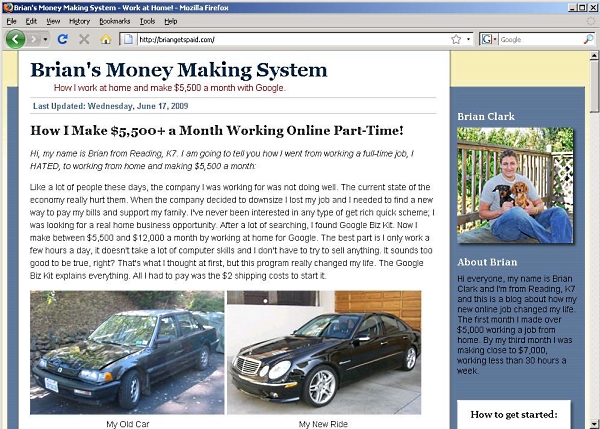With unemployment rate around 10% many people are simply doing everything they can to make ends meet. With no other option than to job search and wait around for phone calls all day, many have turned to the internet to find a way to make some income from home. Many advertisers (companies) cashed in on these people by offering bogus work at home job scams that we will reveal.
How It Works
I’m sure you’ve come across these advertisements promising you to make $823 dollars a day working from home with a few clicks of your mouse. Truth be told, these are all work home home scams that look legit but are actually unethical and illegal. In fact, the FTC has cracked down very heavily on these scams but thankfully the rise and fall of these scams was during the 2008-2009 period when there were very few players and less regulations. Unfortunately these scams still exist today, most likely through loopholes that allow these advertisers (companies) to bypass regulations.
How it works is quite simple. These products are very commonly found on affiliate networks and are Cost Per Action (CPA) type which means every time an affiliate gets a consumer to sign up for the bogus work from home scam, they get paid a certain amount. Usually it is between $30-35 per lead. Anything above $30 is on the high side for a payout for an affiliate program. The reason why is explained next.
Say you come across a website and without doing your research, you decide to sign up for this work from home scam. You fill out your information which includes your personal address, phone, and email typically. Everything seems ok right? The next step will tell you that in order to work from home, you would need to purchase a mandatory “free trial work from home kit” to get you started. Typically this free trial kit will only set you back $0.99-$5. What happens next is the unethical part of the process. In the fine print it says that the free trial is only valid for a set amount of time, usually a week or so. After that you automatically get billed month after month for the full amount which can be anywhere from $50-$100+. This is how these advertisers are able to pay out their affiliates $30+ commissions.
What makes it worse is that these products are not real products. They simply send you vague instructions on how to make money online if anything. If you try to cancel your membership, your only means of communication with the company is through a phone number that is either always busy or never picked up. So consumers that fall into this trap will get billed monthly until they cancel their credit card.
Where You’ll See Them
As we discussed in our previous article, without traffic, you wouldn’t get any sales. A year ago you would have seen these ads all over Google search results but now most of these advertisements are seen advertised on websites. Many websites that would include some major companies such as ESPN.com, CNN.com, Weather.com, Yahoo.com, etc. These companies DO NOT endorse these scams but they only appear because they use an advertising broker to display ads on their website.
Types Of Scams
The name of these scams are virtually in the thousands. Anywhere from Google Cash Machine to Twitter Profit System. Yes these companies associate themselves with big name companies for credibility but in reality these companies have zero association. The names of these are constantly changing so it would be no point to list them. More importantly though is how these affiliates advertise these scams. Typically they are advertised in two forms: flogs (fake blog) & farticles (fake news articles). Think about it for a second, what more assurance would you need if someone with a blog “personally” used this product to make a living or a “news” company did a full report on this “legitimate” job. Below are two screen shots of what typical flogs and farticles look like as well as some clues that would trigger red flags.
Typical Red Flags
– Last updated / published date within a week of current date: People use recent dates to make it seem as though it is a current event.
– “News” Article: If the article is from a “News” source, look it up to make sure it is legit.
– Use of nearby City in advertisement: Usually flogs and farticles will have your current city or a nearby city to make it seem like people locally are doing it.
– Comments in flogs and farticles: Usually these advertisements will have “comments” that will appear real and try to reinforce that it is a legit opportunity. In most cases comments are “closed” for adding.
– Fine print: Always check for the fine print in advertisements. Usually they will say its an advertisement.
If these terms don’t make sense please refer to our Affiliate Marketing For Dummies guide to get you up to speed. Just remember, if it’s too good to be true, it probably is!




